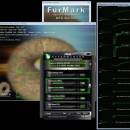- Freeware
- - Development
- - Other
- - FurMark
FurMark 1.15.0 freeware
... VM manager designed for developers seeking simplicity and efficiency. It allows users to launch and manage Ubuntu instances effortlessly, streamlining development workflows. With its intuitive CLI and integration with ... Linux, making it a versatile tool for modern development environments. ...
| Author | Canonical Ltd |
| Released | 2025-02-15 |
| Filesize | 49.30 MB |
| Downloads | 1785 |
| OS | Windows 11, Windows 10 64 bit |
| Installation | Instal And Uninstall |
| Keywords | Linux, Ubuntu, launch, manage |
| Users' rating (35 rating) |
FurMark Free Download - we do not host any FurMark torrent files or links of FurMark on rapidshare.com, depositfiles.com, megaupload.com etc. All FurMark download links are direct FurMark download from publisher site or their selected mirrors.
| 1.15.0 | Dec 11, 2024 | New Release | New features: Clone instances: The new clone command allows you to create full copies of your instances, making it easier to experiment or scale. This feature is supported on all platforms with the default drivers. Updated GUI client: The latest iteration of the GUI client features improvements to the terminal and a redesigned launch and mount experiences. New Windows installer: Multipass for Windows now uses an MSI package, offering enhanced security and a standardized installation, repair, and uninstall process. Other highlights: Updated notifications in the new GUI (#3632, #3724) Improved GUI restoring behavior (#3671) Updates to most of our third-party libraries (#3616) Multiple bug fixes |
| 1.14.1 | Oct 18, 2024 | New Release | A bug fix release addressing a number of issues: Missing snapcraft:24.04/core24 aliases (#3613) Typo in help text (#3648) Misplaced delete/shutdown errors (#3591) stop --force on suspended instances (#3626) Instance selection on the GUI (#3618) Missing update notification in the GUI (#3621) Errors when deleting suspended VMs (#3624, #3606) Missing update notification on restart (#3672) Missed failures on stop (#2907) On Windows only: Inability to detect Hyper-V with screen reader or other PowerShell warnings (#1632) Missing icon on Windows Terminal profile (#3622) |
| 1.14.0 | Jul 25, 2024 | New Release | The main highlight is a brand new graphical user interface, but there are a number of other significant new features as well. The new graphical user interface (GUI) makes it easy and intuitive to manage your Multipass virtual machine instances. This is what we call a minimal viable product and, as time goes on, we will be adding more functionality and tweaking the interface. You can launch the new GUI by looking for "Multipass" in the ways you normally launch applications on your host platform. Please try it out and share your feedback! GUI settings were removed from the CLI and moved to the new GUI: client.gui.autostart and client.gui.hotkey You can now add an external bridged network to an existing instance. Much like what multipass launch --bridged does, but for an already existing instance. In order to do this, you must: Set a default bridge via multipass set local.bridged-network. Set the instance to use the bridged network via multipass set local.<instance-name>.bridged=true. Instances can now be force-stopped using the new --force option: multipass stop --force <instance-name>. Snapshots are now available on the VirtualBox backend, which joins QEMU and Hyper-V in this regard. More highlights: Classic mounts are more secure now (#3323). User and group ID mappings in mounts have been improved to prevent overlaps. The snap package has been greatly optimised: it is now ~48% smaller in size (122MB -> 64MB). The date and time inside an instance are no longer skewed when resuming from suspend (#982). Along with the aforementioned GUI, the icon set has been updated, including light and dark mode icons on macOS. We switched to vcpkg for building the gRPC and POCO library dependencies. New Bash completions for get and set. |

